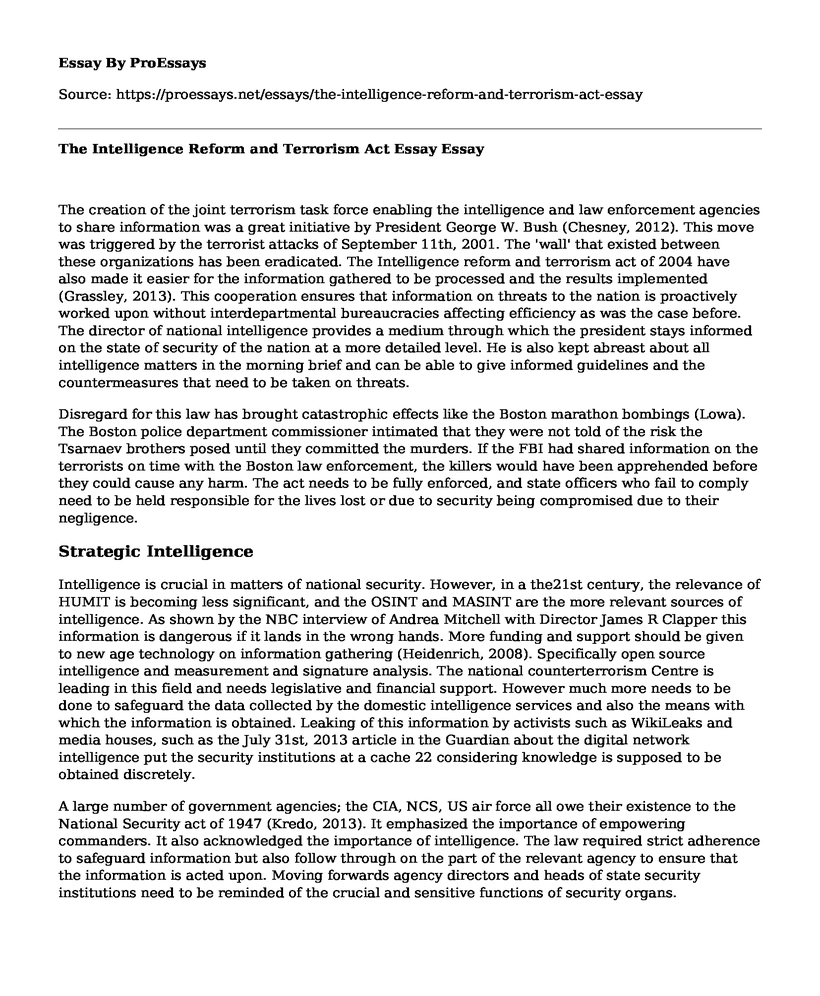The creation of the joint terrorism task force enabling the intelligence and law enforcement agencies to share information was a great initiative by President George W. Bush (Chesney, 2012). This move was triggered by the terrorist attacks of September 11th, 2001. The 'wall' that existed between these organizations has been eradicated. The Intelligence reform and terrorism act of 2004 have also made it easier for the information gathered to be processed and the results implemented (Grassley, 2013). This cooperation ensures that information on threats to the nation is proactively worked upon without interdepartmental bureaucracies affecting efficiency as was the case before. The director of national intelligence provides a medium through which the president stays informed on the state of security of the nation at a more detailed level. He is also kept abreast about all intelligence matters in the morning brief and can be able to give informed guidelines and the countermeasures that need to be taken on threats.
Disregard for this law has brought catastrophic effects like the Boston marathon bombings (Lowa). The Boston police department commissioner intimated that they were not told of the risk the Tsarnaev brothers posed until they committed the murders. If the FBI had shared information on the terrorists on time with the Boston law enforcement, the killers would have been apprehended before they could cause any harm. The act needs to be fully enforced, and state officers who fail to comply need to be held responsible for the lives lost or due to security being compromised due to their negligence.
Strategic Intelligence
Intelligence is crucial in matters of national security. However, in a the21st century, the relevance of HUMIT is becoming less significant, and the OSINT and MASINT are the more relevant sources of intelligence. As shown by the NBC interview of Andrea Mitchell with Director James R Clapper this information is dangerous if it lands in the wrong hands. More funding and support should be given to new age technology on information gathering (Heidenrich, 2008). Specifically open source intelligence and measurement and signature analysis. The national counterterrorism Centre is leading in this field and needs legislative and financial support. However much more needs to be done to safeguard the data collected by the domestic intelligence services and also the means with which the information is obtained. Leaking of this information by activists such as WikiLeaks and media houses, such as the July 31st, 2013 article in the Guardian about the digital network intelligence put the security institutions at a cache 22 considering knowledge is supposed to be obtained discretely.
A large number of government agencies; the CIA, NCS, US air force all owe their existence to the National Security act of 1947 (Kredo, 2013). It emphasized the importance of empowering commanders. It also acknowledged the importance of intelligence. The law required strict adherence to safeguard information but also follow through on the part of the relevant agency to ensure that the information is acted upon. Moving forwards agency directors and heads of state security institutions need to be reminded of the crucial and sensitive functions of security organs.
References
Chesney, R. (2012). Military-intelligence convergence and the law of the title 10/title 50 debate. Journal of National Security Law & Policy. 14(1-19), 539-628.
Heidenrich, J.G. (2008) the state of strategic intelligence: The intelligence Community ' s neglect of strategic intelligence.
Grassley, C. (2013). Intelligence sharing in wake of Boston marathon Bombings. Prepared Floor Statement of Senator Chuck Grassley of
Iowa, Ranking Member, Senate Judiciary Committee. Washington, DC: Office of Senator Grassley. Retrieved from ProQuest.
Kredo, A. (2013). Failure to communicate: Intelligence sharing could have helped prevent Boston marathon bombing. The Washington Free Beacon.
Cite this page
The Intelligence Reform and Terrorism Act Essay. (2022, Jun 30). Retrieved from https://proessays.net/essays/the-intelligence-reform-and-terrorism-act-essay
If you are the original author of this essay and no longer wish to have it published on the ProEssays website, please click below to request its removal:
- Interview Questions on the Influence of Video Games on Different Cultures
- Voting as a Duty of Citizenship Essay
- Expository Essay: The Elderly
- Historical Account of Slavery, Violence and Oppression in Conde on I Tituba
- Paper Sample on Women Consortium of Nigeria (WOCON): Advocating for Gender Equality & Ending GBV
- Essay Example on Journey to Self-Identity: Amy Tan's A Pair of Tickets
- Essay Example on Bullying: Power Dynamics & Its Impact on Society







